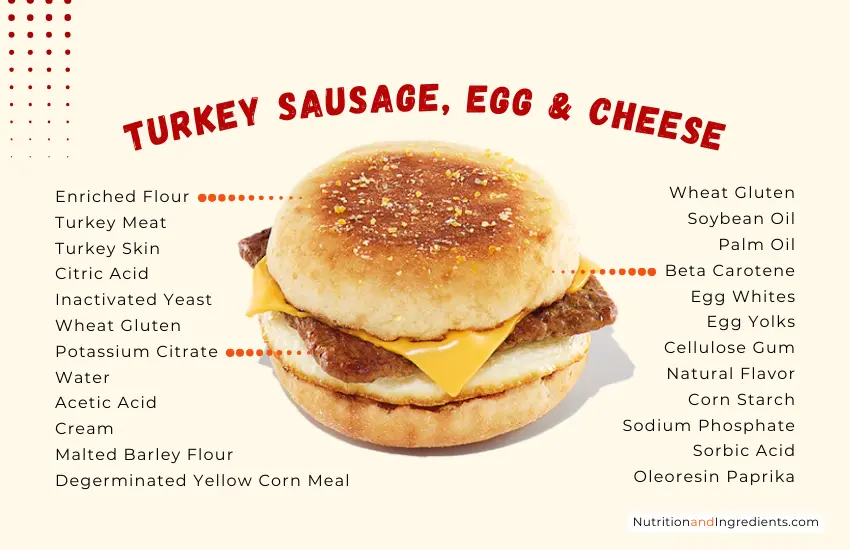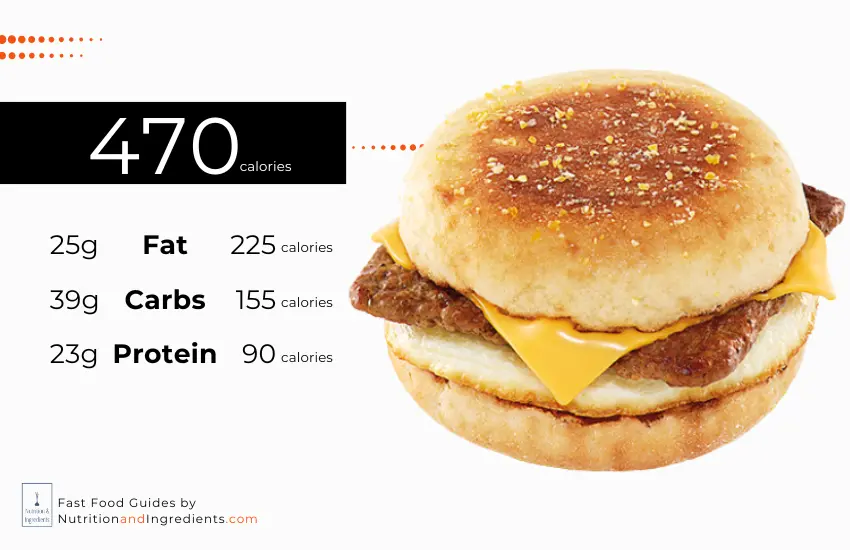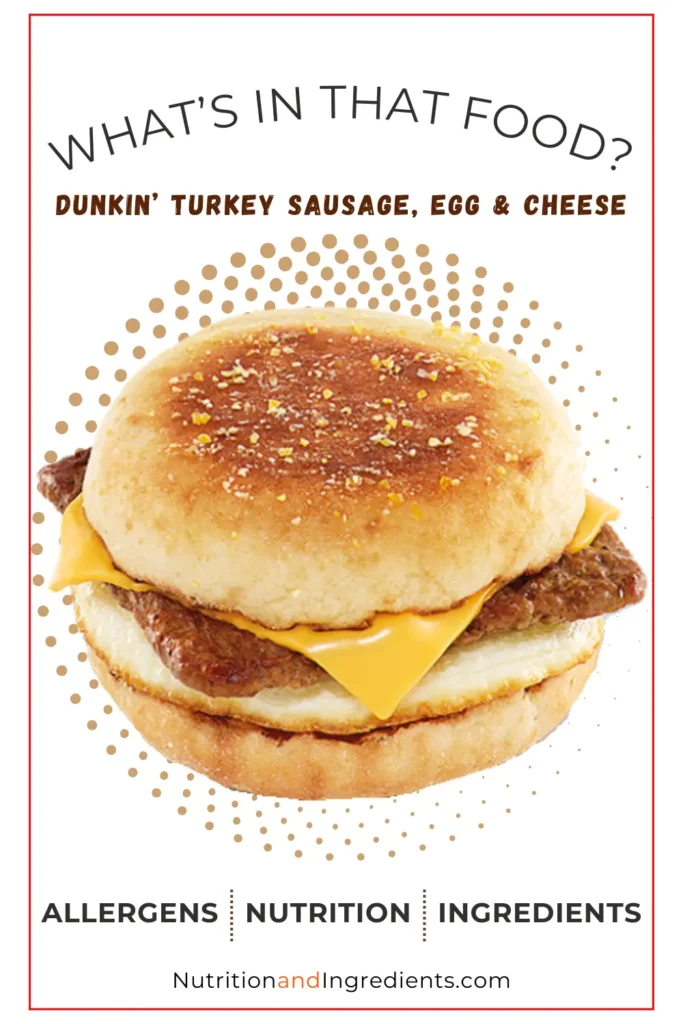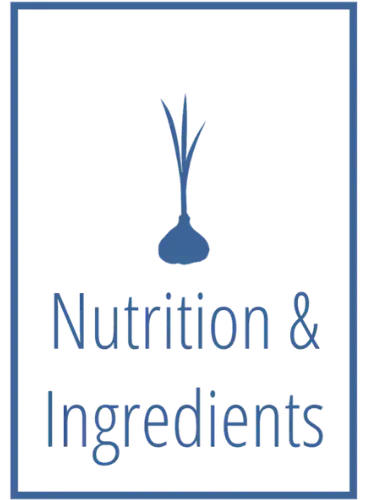Dunkin’ Turkey Sausage, Egg & Cheese

Dunkin’s Turkey Sausage, Egg, & Cheese breakfast sandwich is made with turkey sausage, an egg patty, and a slice of melty American cheese. It’s served on an English muffin.
One Dunkin’ turkey sausage, egg & cheese breakfast sandwich has:
Read this guide for a complete overview of the nutritional information, ingredients and allergens in the popular take out breakfast sandwich.
Dunkin’ Turkey Sausage Sandwich Nutrition
Nutrition facts, including calories, are presented based on a single serving measured as one breakfast sandwich.
Daily Value
Daily value (%DV)1 illustrates how much of a specific nutrient is in one sandwich relative to the recommended daily limit. Use the %DV to compare foods and balance diet choices throughout the day.
As shown in the table below, Dunkin’s breakfast sandwich with turkey sausage, egg, and cheese is high in saturated fat and sodium.
Serving size: 1 Sandwich
% DAILY VALUE
Use %DV to determine if the level of nutrients in a food is low (5% or less) or high (20% or more).
|
%DV |
Level | |
|---|---|---|
|
Saturated Fat |
40% |
HIGH |
|
Sodium |
47% |
HIGH |
|
Added Sugars |
6% |
MED |
%DV based on 2,000 calories. Individual needs vary; your daily value may be lower or higher.

The next section provides an analysis of the calories in a Dunkin’ turkey sausage, egg and cheese sandwich.
Calories
There are 470 calories in the breakfast sandwich.
Here is a summary of calories by macronutrient, per serving:
Nearly half of the total calories are derived from dietary fats. Carbohydrates contribute about 33% of the total calories, and the remaining 19% is from protein.
Dunkin’ Breakfast Sandwich
% calories from fat, carbs and proteinSummary of calories by macronutrient is a rounded estimate based on nutrition facts provided by Dunkin’ Donuts.
Fat and Sodium
A single turkey sausage, egg, and cheese sandwich has 25 grams of total fat, including 8 grams of saturated fat. That is high.
SUMMARY OF FAT PER SERVING
Sodium
According to the U.S. FDA, sodium is a “nutrient to get less of.”
The amount of sodium in one turkey sausage sandwich is high. It has 1,080 milligrams of sodium, nearly half the daily recommended value.
Nutrition Facts
Here is a summary of the nutrition facts in Dunkin’s turkey sausage breakfast sandwich served on an English muffin.
Nutrition Facts
Amount per 1 Sandwich
Red indicates %DV is high.
|
Calories |
470 |
|
%DV | ||
|
Total Fat |
25g |
32% |
|
Saturated Fat |
8g |
40% |
|
Trans Fat |
0g | |
|
Cholesterol |
215mg |
72% |
|
Sodium |
1080mg |
47% |
|
Carbohydrates |
39g |
14% |
|
Dietary Fiber |
1g |
4% |
|
Total Sugars |
4g | |
|
Added Sugars |
3g |
6% |
|
Protein |
23g |
%DV based on a 2,000 calorie diet. Calorie needs vary and your %DV may be higher or lower. Provided for informational purposes only. Consult with your physician for dietary or healthcare advice.

What’s in Dunkin’s Breakfast Sandwich
This popular breakfast sandwich is made with turkey sausage, an egg, and American cheese. It’s a hot sandwich served on an English muffin.
Here is the full list of ingredients in a Dunkin’ Turkey Sausage, Egg & Cheese breakfast sandwich.
Ingredients
|
English Muffin |
|
Enriched Wheat Flour, Water, Bleached Wheat Flour, Sugar, Yeast, Wheat Gluten, Wheat Sourdough, Soybean Oil, Salt, Calcium Propionate, Dough Conditioner, Fumaric Acid, Degerminated Yellow Corn Meal, Pan and Grill Oil. |
|
Turkey Sausage |
|
Turkey Meat, Turkey Skin, Water, Salt, Seasoning, and Spice Extractives. |
|
Egg Patty |
|
Egg Whites, Egg Yolks, Soybean Oil, Water, Corn Starch, Salt, Natural Flavor, Xanthan Gum, Cellulose Gum, and Citric Acid. |
|
Pasteurized Process American Cheese |
|
American Cheese (milk, cheese cultures, salt, and enzymes), Water, Cream, Sodium Citrate, Salt, Sodium Phosphate, Sorbic Acid, Citric Acid, Annatto and Oleoresin Paprika (colors), Acetic Acid, Sunflower or Soy Lecithin. |
Compare ingredients in a McDonald’s Sausage & Egg McMuffin.
Allergens
The turkey sausage, egg and cheese breakfast sandwich from Dunkin’ is made with ingredients that contain eggs, milk, soy, and wheat.
If you have a food allergy, check the full allergen guide for Dunkin’s menu and consult with your physician before deciding which food is right for you.
Fast Food Breakfast Sandwiches
Breakfast Sandwiches: Nutrition Comparison
Here is a quick reference table that summarizes the nutritional information in many popular fast food breakfast sandwiches.
Use the table below as a quick guide to compare the amount of fat, carbs, protein, and sodium in similar menu items to the Dunkin’ Turkey Sausage, Egg & Cheese sandwich.
| Restaurant | Menu Item | Calories | Fat | Carbs | Protein | Sodium |
|---|---|---|---|---|---|---|
| Panera Bread | Sausage & Egg on Asiago Bagel | 810 | 50g | 58g | 32g | 1460mg |
| Burger King | Double Sausage, Egg & Cheese Croissan'Wich | 730 | 55g | 30g | 28g | 1660mg |
| Dunkin' | Sourdough Breakfast Sandwich | 650 | 32g | 58g | 31g | 1360mg |
| Dunkin' | Bacon, Egg & Cheese Croissant | 500 | 32g | 34g | 18g | 810mg |
| Burger King | Sausage, Egg & Cheese Croissan'Wich | 500 | 34g | 28g | 19g | 1040mg |
| McDonald's | Sausage McMuffin with Egg | 480 | 31g | 30g | 20g | 830mg |
| Dunkin' | Turkey Sausage, Egg & Cheese Sandwich | 470 | 25g | 39g | 23g | 1080mg |
| McDonald's | Sausage Biscuit | 460 | 30g | 37g | 11g | 1090mg |
| McDonald's | Bacon, Egg & Cheese Biscuit | 460 | 26g | 39g | 17g | 1330mg |
| White Castle | Breakfast Toast with Sausage | 420 | 27g | 29g | 16g | 850mg |
| McDonald's | Sausage McMuffin | 400 | 26g | 29g | 14g | 760mg |
| Burger King | Bacon, Egg & Cheese Croissan'Wich | 360 | 21g | 28g | 15g | 810mg |
| Burger King | Egg & Cheese Croissan'Wich | 310 | 17g | 28g | 12g | 640mg |
| White Castle | Original Slider with Egg & Cheese | 280 | 18g | 17g | 14g | 600mg |
| Dunkin' | Bacon Wake-Up Wrap | 220 | 13g | 15g | 10g | 590mg |

Nutrition facts, prices, and ingredients are based on available information as of the date of publication. Restaurants and food manufacturers may change recipes or formulations without notice. Check package labels and ask the product manufacturer or restaurant for the most up-to-date information. Unless otherwise stated, %DV is based on a 2,000 calorie diet. All reports and reviews published on this site are for informational purposes only. NutritionandIngredients.com does not provide healthcare advice or dietary recommendations. Always consult your licensed physician for any healthcare or dietary advice.
- How to Calculate % Daily Value
Here is how to calculate the daily value for total fat in the sandwich.
FDA recommends limiting calories from total fats to 35% or less of total calories
35% of a 2,000 calorie diet = 700 calories
225 calories from fat in one sandwich is 32% of the 700 calorie limit (225 / 700 = 32%)
Daily value is generally based on a 2,000 calorie daily diet. Individual needs vary and your daily value may be higher or lower. To adjust, substitute total calories consumed per day in place of 2,000.
For more information, check the FDA Reference Guide for Daily Values for Nutrients ↩︎ - Is Maltodextrin Bad for Me? (Healthline)
Impact of Food Additives… (National Library of Medicine)
Maltodextrin, Modern Stressor of the Intestinal Environment (National Library of Medicine) ↩︎
Nutrition facts, allergens, and ingredients source: Dunkin’. Sandwich image courtesy of Dunkin’ Donuts. Original designs by Nutrition & Ingredients for purposes of research and commentary related to fast food nutrition.
